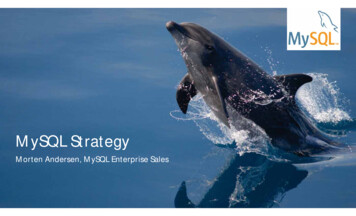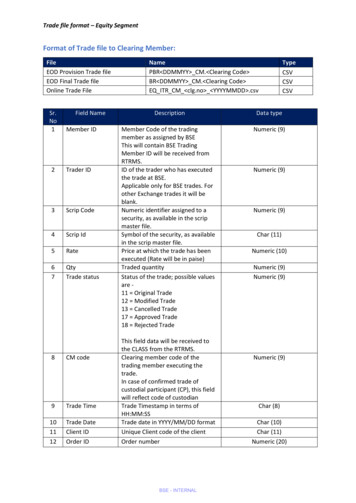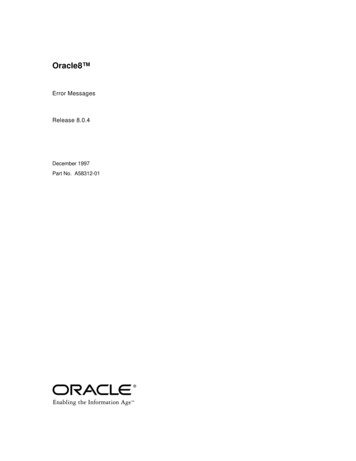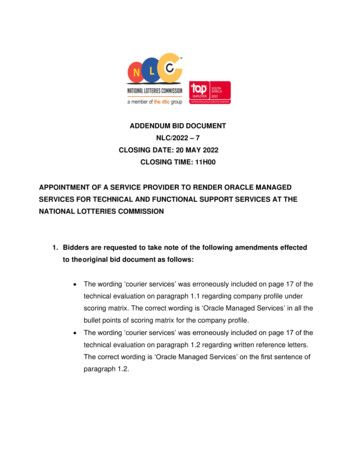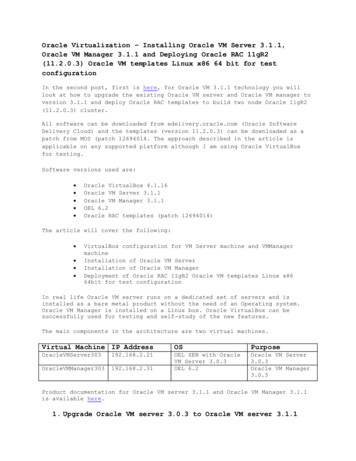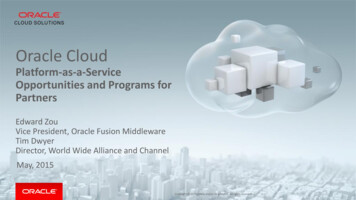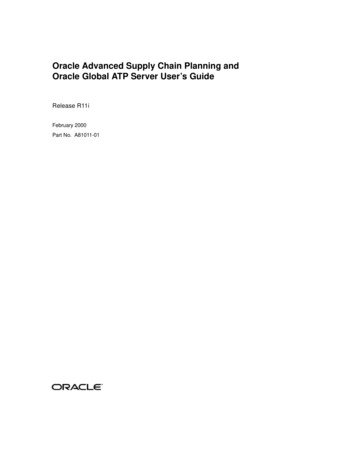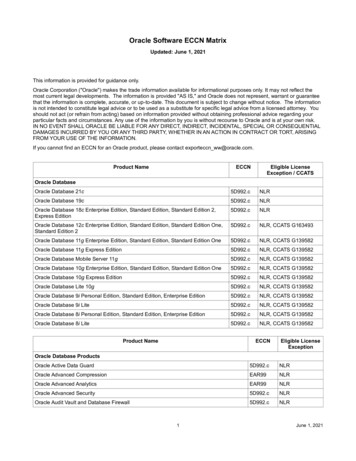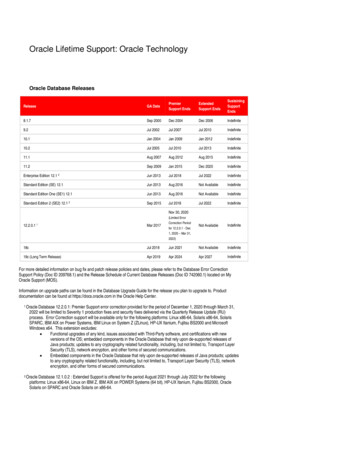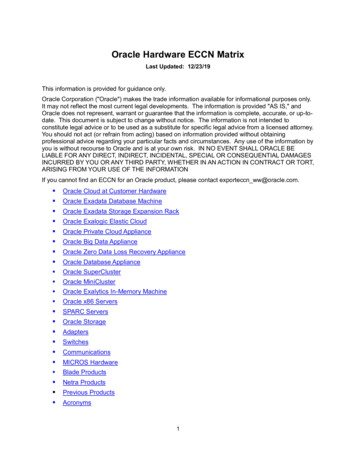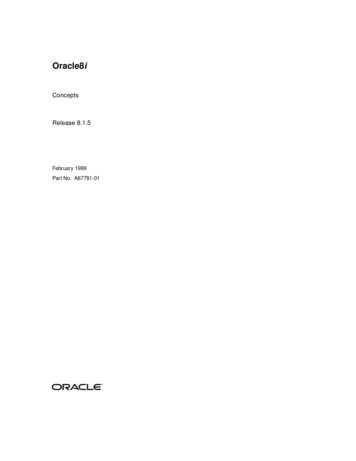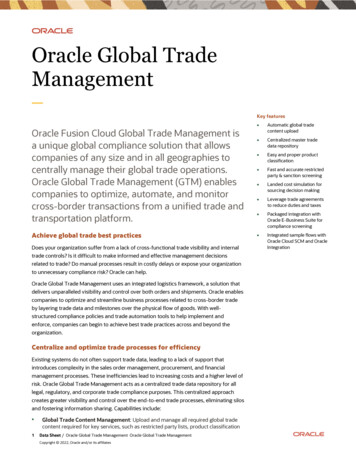
Transcription
Data SheetOracle Global TradeManagementKey featuresOracle Fusion Cloud Global Trade Management isa unique global compliance solution that allowscompanies of any size and in all geographies tocentrally manage their global trade operations.Oracle Global Trade Management (GTM) enablescompanies to optimize, automate, and monitorcross-border transactions from a unified trade andtransportation platform.Achieve global trade best practicesDoes your organization suffer from a lack of cross-functional trade visibility and internaltrade controls? Is it difficult to make informed and effective management decisionsrelated to trade? Do manual processes result in costly delays or expose your organizationto unnecessary compliance risk? Oracle can help.Oracle Global Trade Management uses an integrated logistics framework, a solution thatdelivers unparalleled visibility and control over both orders and shipments. Oracle enablescompanies to optimize and streamline business processes related to cross-border tradeby layering trade data and milestones over the physical flow of goods. With wellstructured compliance policies and trade automation tools to help implement andenforce, companies can begin to achieve best trade practices across and beyond theorganization.Centralize and optimize trade processes for efficiencyExisting systems do not often support trade data, leading to a lack of support thatintroduces complexity in the sales order management, procurement, and financialmanagement processes. These inefficiencies lead to increasing costs and a higher level ofrisk. Oracle Global Trade Management acts as a centralized trade data repository for alllegal, regulatory, and corporate trade compliance purposes. This centralized approachcreates greater visibility and control over the end-to-end trade processes, eliminating silosand fostering information sharing. Capabilities include: 1Global Trade Content Management: Upload and manage all required global tradecontent required for key services, such as restricted party lists, product classificationData Sheet / Oracle Global Trade Management Oracle Global Trade ManagementCopyright 2022, Oracle and/or its affiliates Automatic global tradecontent upload Centralized master tradedata repository Easy and proper productclassification Fast and accurate restrictedparty & sanction screening Landed cost simulation forsourcing decision making Leverage trade agreementsto reduce duties and taxes Packaged integration withOracle E-Business Suite forcompliance screening Integrated sample flows withOracle Cloud SCM and OracleIntegration
codes, and more. Working with a third-party content provider, Oracle GTM providestools for automated upload and processing of trade content for immediate or lateruse. For more information, refer to the Global Trade Content data sheet. Trade Master Data: Maintain trade related data such as item ID, description, andcountry of origin. Suppliers can upload product catalog and classification datadirectly, while brokers can download, update, or simply view product classificationdata and other required compliance elements for prompt and accurate Customsfilings. Oracle GTM also allows users to store and manage trading partner data suchas end-use and end-user profiles, anti-boycott flags, registrations, certifications, andother compliance or security-related information for all your customers, suppliers,carriers, customs brokers, freight forwarders, and third-party logistics providers.Event Management and Visibility: Proactively manage the compliance events oforders and shipments. For example, automatically screen transactions for restrictedparties, licenses and any other trade controls when received from the externalsystem. Notify or alert users to potential problems instantly. Business Process Automation: Maximize productivity by automating processesusing unique workflow agent technology. Workflow agents enable companies tomodel simple or complex processes to improve efficiency. Reporting & Documents: Oracle GTM utilizes Oracle Analytics Publisher to createreports and documents allowing customers to create their own documents or reportswith the solution. A few examples are: restricted party audits, import/exportsummary reports, commercial invoices, or country of origin certificates for anycountry. Supporting trade documents can be uploaded, attached to transactions, andmanaged in Oracle GTM. Packaged Integration with Oracle E-Business Suite (EBS): Oracle GTM and EBSintegration supports synchronization of item and party master data, as well asautomated EBS sales order and delivery compliance screening. Integration with Oracle Supply Chain Management Cloud: Oracle GTM and OracleCloud SCM sample integration recipe is available through Oracle Integration. Thebaseline integration enables party, item and trade compliance screening in GlobalTrade Management of orders from Order Management and shipments fromInventory Cloud. This baseline integration can be extended to meet specificintegration needs.Ensure proper product classification for global complianceDoes your company have a need to maintain multiple types of product classification typesand codes for different countries? Do you have redundant classification processes? Dothird parties provide pre-classifications?Oracle Global Trade Management offers a robust product classification workbench forusers to classify items under multiple lists for trade in specific jurisdictions and follow anyassociated rules those commodities might be subject to for compliance purposes.The following are examples of Oracle Global Trade Management capabilities: 2Product Classification Determination: Configurable determination logic in order toproperly classify an item based on user-defined rollup classification criteria. Forexample, for assemble-to-order (ATO) items, Oracle Global Trade Management canautomate the classification determination of the top-level (parent) item based on theclassifications of all the sub-components using rollup logic dictated by jurisdiction.Data Sheet / Oracle Global Trade ManagementCopyright 2022, Oracle and/or its affiliatesKey business benefits Accelerate cash flow Streamline processesthrough automation Provide visibility to tradedata Mitigate compliance risk Increase productivity andefficiency Reduce costs Sourcing optimization Achieve best practices
Guided Classification Tools: Product classification lookup for multiple productclassification codes types and returns the results in an easy-to-use tree or grid thathighlights key words to easily identify the chapters where those words appear. Product Classification Translation: Quickly perform translation lookups forclassifications of the same type (e.g., Harmonized Tariff Schedule or ECCN) to viewrelated country target codes for the source classification code. Users can createproduct classification templates to easily assign items into a pre-configuredclassification structure. Detect Invalid and Missing Classifications: Easily identify if any of the existingproduct classifications used in the repository are invalid based on the most currenttariff nomenclature. In addition, Oracle Global Trade Management allows users tosearch for items requiring classification. Duty and Tax Visibility: View the Duties, Taxes, and Fees associated with a productclassification including those rates for preferential trade programs. Perform analysisof duties taxes applicable to certain country pairings to assist with decisionsregarding sourcing your goods. Product Classification Approval Workflow: Once a product has been assigned aclassification, Oracle Global Trade Management provides a powerful approvalworkflow process that ensures the assigned code is reviewed and approved to ensureproper classification.Mitigate compliance risk with next-generation screeningLaws in many countries require the use of compliance screening, both on the import andexport sides of trade. The goal is to ensure that no goods are shipped to prohibitedcountries, organizations or individuals for national and international security purposes.Oracle Global Trade Management provides next-generation screening capabilities: Restricted Party List and Sanctioned Territory Screening: A configurablescreening platform to optimize potential match results. The engine can be called atany point in a business process and offers different types of screening services fordifferent milestones. Users can fine tune the fields screened, the thresholds, and theweights for proper match determination. Users can screen parties at the time of partycreation, which ensures they are cleared for compliance when transactions occur.Restricted Party Screening Workbench allows users working in high volumeenvironments to perform fast and efficient screening. In addition, work assignmentsto users in separate queues are also supported. Flexible Matching Engine Options: Matching engines can be used strategically todrive the potential match result. Oracle Global Trade Management offers four typesof matching logic engines to satisfy screening requirements. One type is languageagnostic, which can support the screening of double-byte characters often found inEuropean and Asian languages. Simplified Potential Match Resolution: When potential matches occur, userscan easily view the results and related information to make a quick and informed decision.This includes links to the Federal Register citations, alias information, agency list codesand more. Historical screening data and changes of a specific party can be viewed easilyfrom various sources in one user interface.3Data Sheet / Oracle Global Trade ManagementCopyright 2022, Oracle and/or its affiliates
Figure 1. Restricted Party Screening Workbench allows users working in high volume environmentsto perform fast and efficient screeningMake optimum sourcing decisionsWhen trying to accurately calculate your Estimated Landed Cost considering all costs,Oracle Global Trade Management’s landed cost simulator can simulate different supplieroffers to make optimum sourcing decisions. With the Landed Cost Simulator, users havethe flexibility to create their own Estimated Landed Cost (ELC) formula including bankfees, commissions, customs brokerage fees and many more allowing them to be asaccurate as they want with the ELC results. It is also possible to have the tool estimateeach cost using pre-defined formulas providing a standardized ELC calculation. Inaddition, the solution provides visibility of financial benefits for Trade Agreements whendisplaying the estimated landed cost results for different sourcing options.Figure 2. Landed Cost Simulator enables easy comparison of different sourcing optionsLeverage trade agreements for a more cost-effective supply chainManaging trade agreements is a significant effort for most organizations thatimport/export qualifying goods, and organizations often sacrifice savings on import4Data Sheet / Oracle Global Trade ManagementCopyright 2022, Oracle and/or its affiliates
duties due to the significant paperwork required. You need a solution that allows you toproactively identify duty savings opportunity and easily turn that into action.Oracle GTM provides a comprehensive solution for you to leverage trade agreements toreduce duties and taxes while lowering your team’s compliance workload. Country of Origin Management: Support tracking Country of Origin by inventoryorg or supplier site, and optionally leverage lot number, serial number, or inventorylocation tracking. Trade Agreement Eligibility Screening: Identifies opportunity to save on duty andtax. When a new supplier is added, Country of Origin is updated or a productclassification is assigned, the user can easily check if any trade agreement can apply.If any item is identified as trade agreement eligible, users can preview and comparepotential duty rate savings. Supplier Solicitation & Campaign Management: Create campaigns, notifysuppliers, and track status automatically. The application will notify suppliersautomatically with instructions on how to fill out forms, provide them with links toaccess the application, together with the deadline for submitting response. TheCampaign Manager can track status and easily view and approve submissions. EachCampaign Line tracks information required for solicitation, such as the documentsuploaded, origin & certificate data. Trade Agreement Qualification: Qualify goods against the rules of origin for tradeagreements around the globe. Easily qualify items and review the results or schedulea batch process to automatically qualify large volumes in the background. Reviewresults in your workbench, and access detailed reports that explain exactly how yourgoods qualified. Generate, distribute, and archive any certificates of origin required tosupport your business needs.Figure 3. Campaign Management allows users effectively communicate with suppliers to solicitCountry of Origin data to qualify for trade agreement.Centralize worldwide trade complianceDoes your company find it difficult to manage all regulatory or internally mandated traderules in your current trade environment?5Data Sheet / Oracle Global Trade ManagementCopyright 2022, Oracle and/or its affiliates
Most organizations outsource trade compliance or manage it within a fragmentedorganizational structure, and result in challenges regarding visibility to goods, control ofprocesses and product allocation, and overall supply chain cost effectiveness.Trade Compliance offers advanced compliance screening and document managementbeyond just restricted party and sanction screening. Users can model their own uniquetrade compliance environment worldwide using the global approach and design for OracleTrade Compliance. The solution performs advanced compliance screening and controldetermination for licenses, exceptions, documents, and regulator trade controls. Userscan manage the entire import/export license lifecycle. For more information, refer to theTrade Compliance data sheet.Unify global customs managementDoes your company have regional processes for managing various customs procedures?Do you find it difficult to manage all regulatory and partner mandated trade data in yourcurrent customs environment?Today, most organizations look to regional brokers to manage customs processes thushaving different business practices globally. This type of approach leads to challengesregarding maintaining common data used globally in multiple places, lack of standardcontrol of procedures, and overall supply chain cost effectiveness.Customs Management capabilities enable companies to model their unique customsprocesses and procedures. Each company’s approach is based on the specific industry,governing rules and regulations, commodities they trade, countries with which they trade,and the processes employed—whether import or export. Customs Management allowsusers to manage shipments, estimate expected duties and taxes, and create declarationsand documents for customs filing or sharing with your broker. Customs Management alsoprovides support for filing information with customs authorities, or handling two-wayelectronic communication with your customs broker, or other trading partners. For moreinformation, refer to the Customs Management data sheet.Monitor performance managementDoes your company know the volume of trade and the impact of compliance on theoverall success of the business?Today, many organizations don’t have a complete picture of their total global trade riskexposure because the information needed is in other disparate systems. Without thiscentric visibility, companies are slow to evaluate how potential changes in trade effecttheir companies financial and compliance risk.Oracle GTM has built-in Global Trade Intelligence capabilities which provides you with theinformation needed to understand what is happening in your business so you can achieveyour organizational goals. Global Trade Intelligence promotes better supply chaindecisions by providing greater insight into both internal operations and trading partnerperformance. Global Trade Intelligence provides a dashboard view into the unique metricsby which your customs and compliance operation measures success. Users can modifyexisting formulas and / or create custom measurements. For more information, refer tothe Global Trade Intelligence data sheet.6Data Sheet / Oracle Global Trade ManagementCopyright 2022, Oracle and/or its affiliates
Standards-based architectureOracle Global Trade Management is built on a best-in-class, internet-based architecturethat provides maximum flexibility and lowest total cost of ownership.Internet Application: All Oracle Global Trade Management functionality is accessible viastandard web browsers, enabling organizations to deploy globally with minimal effort. Secure Collaboration: Oracle’s security model enables companies to collaborate withany trading partner – suppliers, customers, carriers, brokers, etc. – by enabling theseparties to access relevant information and business functions in Oracle Global TradeManagement, for example, suppliers can upload product catalogs and classifications,carriers can add relevant Customs-filing data to shipments, and Brokers can pullclassification data. Service Oriented Architecture: Oracle Global Trade Management fully supports aService-Oriented Architecture (SOA) for maximum business process flexibility.Companies can support their specific business process requirements by leveragingthe solution’s web services. Scalability: Oracle Global Trade Management’s flexible architecture enablescompanies to start small and expand as necessary to support growth in users,transaction volume and business processes while maintaining high performanceservice levels.Integrated logistics platformOracle has a holistic approach to logistics management. Using a single system approach,which includes Oracle Transportation Management and Oracle Global TradeManagement, Oracle provides visibility to trade and transportation orders and shipmentsin one application. Additionally, a robust supply chain event management and workflowengine allows companies and their trading partners to share data and documents, andmore effectively control what they need, when they need it.7 Document Management: Determine and produce the necessary tradedocuments and certificates for each transaction. Validate the availability of keydata elements. Use auto-assignment logic to help populate missing fields. Withboth Oracle Transportation Management and Oracle Global Trade Managementit is easy to produce documents that require both trade and transportation datato complete and produce. Shared Data Model, Workflow, and Services: Built on a common platform, dataobjects are shared between Oracle Transportation Management and OracleGlobal Trade Management allowing trade and transportation teams tocollaborate on a single source of truth and maintain complete visibility as theshipment progresses. Shared workflow and services allow for execution of crossfunctional processes and seamless sharing of documents and information.Data Sheet / Oracle Global Trade ManagementCopyright 2022, Oracle and/or its affiliatesRelated productsOracle Global Trade Managementis a key component of OracleCloud Supply Chain Managementsolutions that work together toprovide with a broad array ofcapabilities: Oracle TransportationManagement Oracle WarehouseManagement Oracle Internet of Thingsapplications Oracle Intelligent Track andTrace
Connect with usCall 1.800.ORACLE1 or visit oracle.com. Outside North America, find your local office at: acleCopyright 2022, Oracle and/or its affiliates. All rights reserved. This document isprovided for information purposes only, and the contents hereof are subject to changewithout notice. This document is not warranted to be error-free, nor subject to any otherwarranties or conditions, whether expressed orally or implied in law, including impliedwarranties and conditions of merchantability or fitness for a particular purpose. Wespecifically disclaim any liability with respect to this document, and no contractualobligations are formed either directly or indirectly by this document. This documentmay not be reproduced or transmitted in any form or by any means, electronic ormechanical, for any purpose, without our prior written permission.This device has not been authorized as required by the rules of the FederalCommunications Commission. This device is not, and may not be, offered for sale orlease, or sold or leased, until authorization is obtained.8Data Sheet / Oracle Global Trade ManagementCopyright 2022, Oracle and/or its affiliatestwitter.com/oracleOracle and Java are registered trademarks of Oracle and/or its affiliates. Other names may betrademarks of their respective owners.Intel and Intel Xeon are trademarks or registered trademarks of Intel Corporation. All SPARCtrademarks are used under license and are trademarks or registered trademarks of SPARCInternational, Inc. AMD, Opteron, the AMD logo, and the AMD Opteron logo are trademarks orregistered trademarks of Advanced Micro Devices. UNIX is a registered trademark of The OpenGroup. 0122Disclaimer: If you are unsure whether your data sheet needs a disclaimer, read the revenuerecognition policy. If you have further questions about your content and the disclaimerrequirements, e-mail REVREC US@oracle.com.
Integration with Oracle Supply Chain Management Cloud: Oracle GTM and Oracle Cloud SCM sample integration recipe is available through Oracle Integration. The baseline integration enables party, item and trade c ompliance screening in Global Trade Management of orders from Order Management and shipments from Inventory Cloud.
